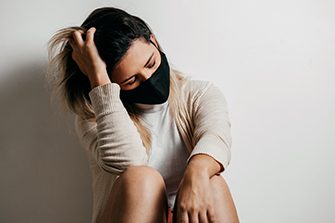There are epidemics you are used to hearing about: opioids, Molly, methamphetamines, and more. But, one epidemic you might not be used to hearing about is the mental health epidemic. It’s no surprise that the past year has been difficult for many people and, in a new article from CNN, it has gotten bad enough to be called a mental health epidemic. Keep reading to find out more about the mental health epidemic of 2021, how you can help, and things you can do to start helping your own mental health.
Mental Health Epidemic of 2021: Statistics
Some statistics regarding the mental health epidemic of 2021 from the CDC include:
- Symptoms of anxiety disorder and depressive disorder increased considerably in the United States during April–June of 2020, compared with the same period in 2019
- 40.9% of people in a recent study reported at least one adverse mental or behavioral health condition, including symptoms of anxiety disorder or depressive disorder related to the pandemic
- In the same study, the percentage of respondents who reported having seriously considered suicide in the 30 days before completing the survey was 10.7% and was significantly higher among respondents aged 18–24 years
- 21% of those who considered suicide were essential workers
Mental Health Disorders and Relapse Begin in Isolation
The most important components of any recovery program include support, regular aftercare, and staying busy. However, the coronavirus pandemic has left everybody isolated with limited resources and activities to take part in. While it is the right thing to do for the greater good of public health, this kind of isolation is extremely damaging to individuals with mental health conditions or substance use disorders.
More reasons for this include:
- Spending a lot of time in a triggering environment. For many, being at home alone can be triggering. It can be difficult to deal with thoughts, feelings, and cravings alone. Before the pandemic, people feeling this way were able to get out of the house, go to a meeting, or lean on their support.
- Lack of privacy for help. Individuals with a spouse and children at home, many roommates, or other family members around can find it difficult to find the privacy needed to have a telehealth appointment with their therapist or doctor.
- Lack of self-care and options for a daily routine. Before the pandemic, going to a favorite coffee shop or the gym every day were great stress relievers and part of a healthy daily routine. These days, it can be hard to find ways to fill that gap.
What Can Be Done?
Until all public health measures have been lifted and life can start feeling a little bit more like “pre-pandemic normal”, we all have to find ways to help each other out through this difficult time of the mental health epidemic of 2021.
- Check-in with your loved ones. Take the time to check in with your loved ones, even if they “seem fine”, especially if they have a history of mental health issues or substance abuse.
- Expand your bubble. If having an in-person support system is important for you, and you are able to, consider expanding your bubble or being part of someone else’s expanding bubble.
- Offer help. If you know an essential worker or if you are noticing one of your loved ones is struggling, find ways to offer help in their daily life. Things like dropping off meals and helping with children’s schooling are big ways to make an impact other than check-in phone calls or texts.
Keeping Your Own Mental Health In Check
One of the best ways to combat the mental health epidemic of 2021 is by starting with yourself. Keeping your own mental health in check is extremely important during this time, and some ways you can do that include:
- Helping others. It is rewarding to help others, so find ways you can get involved with organizations you care about or by helping a friend or family member.
- Take time for self-care. Take some time to indulge in a nightly bowl of ice cream or take a long bubble bath — whatever helps you destress at the end of the day, do that!
- Eat healthily and stay active. It can be tempting to eat poorly during the pandemic and to be lazy on the couch. While there is nothing wrong with having a lazy day here or there, make sure you eat healthily and stay active to keep stress levels and anxiety levels down.
About The Pointe in Malibu
We provide recovery solutions for drug and alcohol addiction, process addictions, mental health epidemic of 2021 issues including depression and anxiety, co-occurring disorders, and chronic pain addictions. Our rehab treatment programs are proven effective, evidence-based solutions. We provide world-class medical and clinical treatment with a large on-site staff of professionals. Our facilities provide luxurious accommodations – which our affluent clients are accustomed to and expect.
Each client undergoes a compassionate and thorough diagnostic assessment. The assessment provides an individual set of recovery goals. Our experienced medical, clinical, and addiction professionals tailor corresponding programs and highly customized treatment plans.
To help you find your way through to the life you want, The Pointe Malibu offers a complete series of support programs. With care and compassion, our treatment experts will guide you through every phase of the recovery process. We staff doctors, psychiatric and addiction specialists, therapists, and support staff. Together, we provide a complete continuum of care from your arrival to your growth into a better life.
For more information, visit thepointemalibu.com
